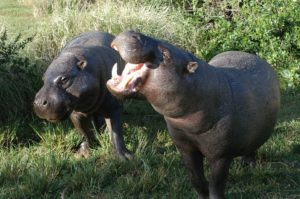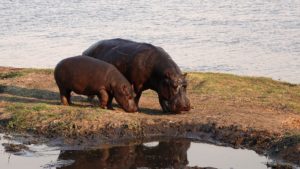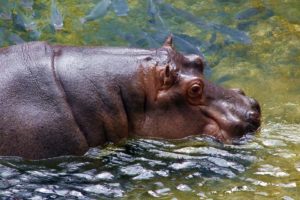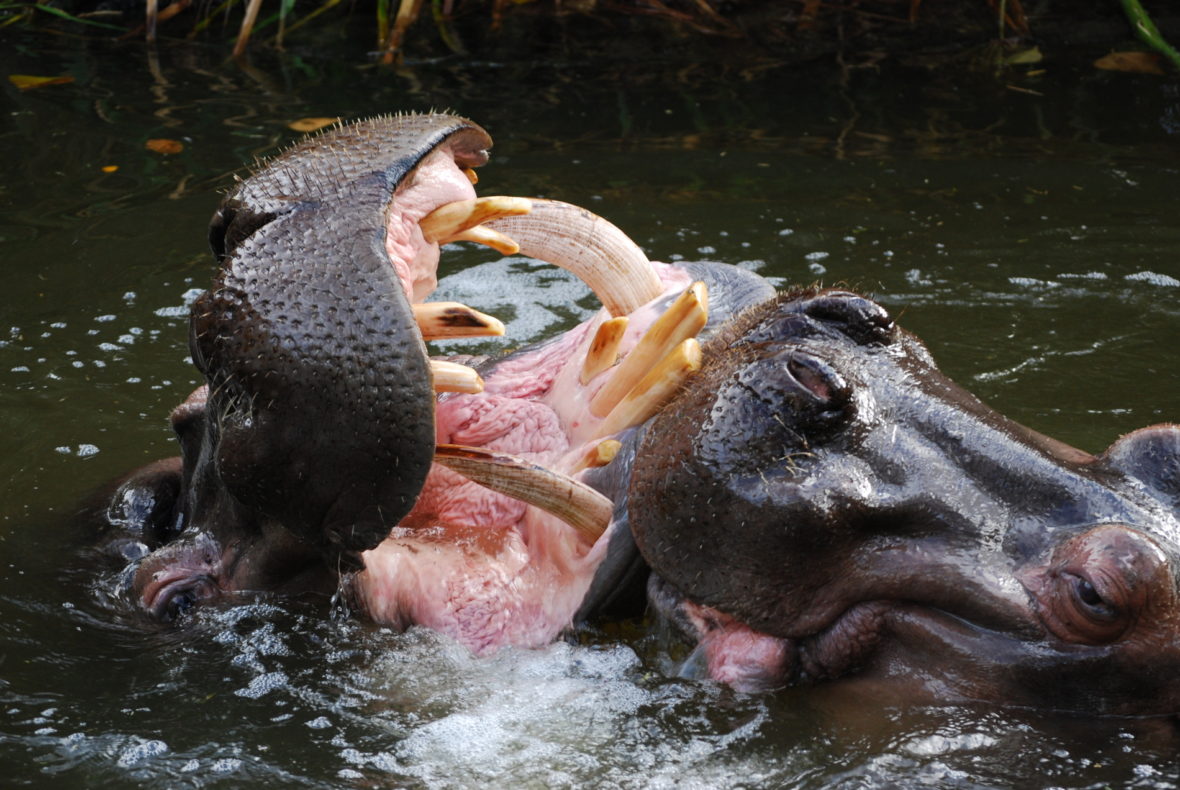Hippos, Hippopotamus amphibius, are large semi aquatic mammals that are usually found in rivers and lakes across sub-Saharan Africa. The name “hippopotamus” comes from an Ancient Greek word that roughly translates to “river horse.” The closest relatives to hippos are pigs, whales and dolphins. Take a look below for 27 more fascinating and bizarre facts about hippos.
1. There are 2 hippo species, which are the common hippo and the smaller pygmy hippo.
2. Hippos are the 3rd largest living land mammals, right after rhinos and elephants.
3. On average, they are between 3.3 and 5 meters, or 10.8 and 16.5 feet, in length and up to 1.6, or 5.2 feet, tall, when measured at the shoulders.
4. Male hippos weigh between 1,600 and 4,500 kilograms, or 3,500 and 9,920 pounds. Female hippos weigh about 1,400 kilograms, or 3,000 pounds.
5. Wild and captive hippos live between 40 and 50 years. The oldest known hippo lived to be 61 years in captivity.
6. Their eyes, ears and nostrils are located at the top of their head. This allows them to hear, see and breathe while most of their body is underwater.

7. They have a clear membrane that covers and protects their eyes while allowing them to see underwater. Their nostrils close in order to keep water out and they can hold their breath for 5 minutes or longer.
8. They’re known to sleep underwater. They can do this by using a reflex that allows them to bob up, take a breath, and then sink back down without waking up.
9. They spend up to 16 hours per day submerged in rivers and lakes. This is because they need to keep their massive bodies cool under the hot African sun.
10. Even though they have adapted well for living in water, they’re not very good swimmers.
11. They move around lakes and ponds by pushing off from the bottom of the river or by walking along the riverbed in a slow motion gallop, lightly touching the bottom with their toes.
12. Their skin is unique and needs to be kept wet for most of the day.
13. They don’t have any scent or sweat glands. they have mucous glands that secrete a thick oily layer of red pigmented fluid. This fluid was long thought to be a mixture of blood and sweat, which is what gave it the name “blood sweat.”
14. They’re a herbivore, which means that their diet is mostly plant based.
15. Right at sunset, hippos will leave the water and travel on land to graze. They are known to travel up to 10 kilometers, or 6 miles, in a night, along pathways to find and consume 35 kilograms, or 80 pounds, of grass.
16. They’re able to store 2 days worth of grass in their stomachs, which allows them to go up to 3 weeks without eating.

17. Despite their massive size and short legs, they’re able to run over 30 kilometers, or 19 miles, per hour over short distances.
18. Hippos are one of the most aggressive creatures in the world and are often regarded as one of the most dangerous animals in Africa.
19. They have canine and incisor teeth that grown continuously. Their canine teeth reach 51 centimeters, or 20 inches, in length. They’re known for using their canines for fighting.
20. They’re very social animals and are known to live in groups of 10 to 100 hippos. No matter their size, the group is led by one dominant male hippo.
21. The dominant male hippo has the right to mate with all the adult females in his herd. However, he sometimes allows other males of his herd to come in and mate.
22. Breeding can occur at any point of the year, but it’s the most common between February and August.
23. Female hippos will remain pregnant for 8 months and will have one offspring at a time. When she’s ready to give birth, she will leave the herd for 1 to 2 weeks.

24. The female hippo will stay in the water with her newborn offspring for several days without eating as she waits for it to be strong enough to keep up with the herd.
25. Young hippos will be nursed by their mother on land for 18 months. Once it’s 5 to 7 years old, it will be fully mature and ready to fend for itself.
26. Several fish species in African feed on the food remnants and dead skin cells found on a hippos skin.
27. Hippos vocalize on both land and in the water. They’re the only mammals that make amphibious calls.





One Comment
Pingback:
February 6, 2018 at 12:19 pm